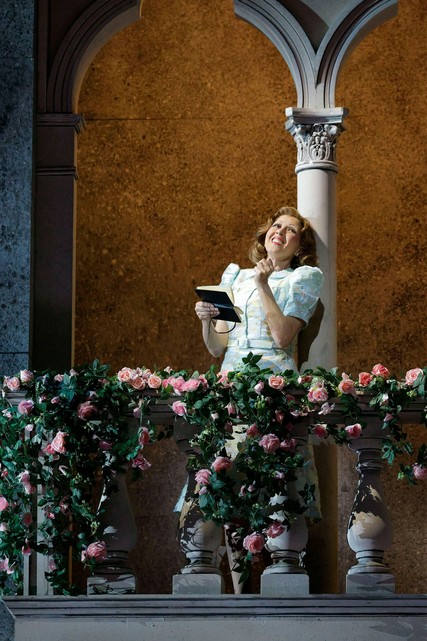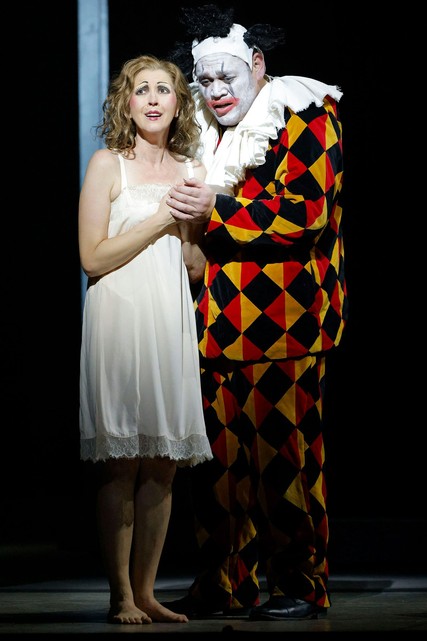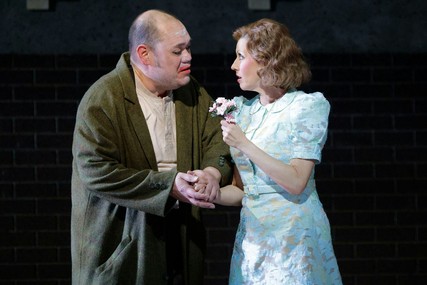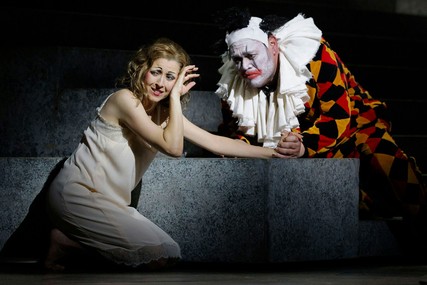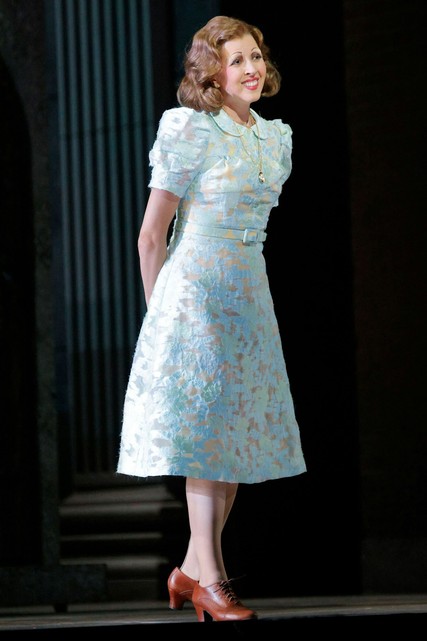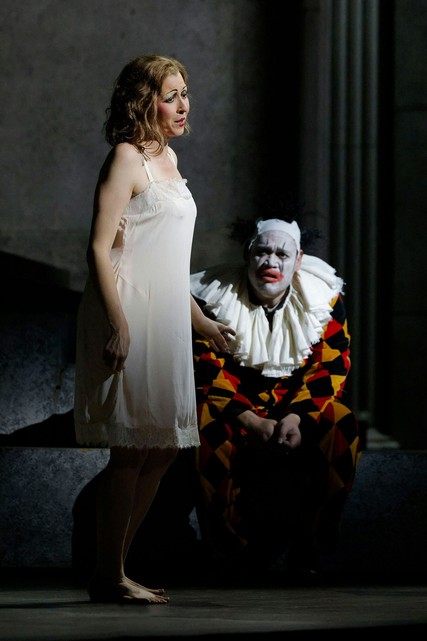Cast
| Rigoletto | Quinn Kelsey | |
| Gilda | Lisette Oropesa | |
| Duke of Mantua | René Barbera | |
| Count Monterone | Blake Denson | |
| Sparafucile | Peixin Chen | |
| Maddalena | Sarah Saturnino | |
| Marullo | Hyungjin Son | |
| Borsa | Nathan Bowles | |
| Count Ceprano | Vinícius Costa | |
| Giovanna | Madeleine Lyon | |
| Page | Gabrielle Turgeon |
James Conlon
DirectorTomer Zvulun
Set DesignerErhard Rom
CostumesJessica Jahn
LightingRobert Wierzel
ChorusmasterJeremy Frank
ChoreographyRicardo Aponte
Fight DirectorAndrew Kenneth Moss
About
In a court ruled by decadence and corruption, the Duke of Mantua sits on top. Whatever he wants, he gets. And lately, he’s set his sights on Rigoletto’s daughter. It’s enough to send the carefree court jester into a deadly rage, but revenge comes at a price he never expected.
Verdi master James Conlon conducts Rigoletto, featuring some of the most famous music ever written. Quinn Kelsey, the premier Verdi baritone of his generation, returns to star in the title role. Tenor René Barbera portrays the suave and sadistic Duke, and two dazzling sopranos, Lisette Oropesa and Kathryn Lewek, share the role of Gilda, his unsuspecting prey. Stage director Tomer Zvulun updates the action to Mussolini’s Italy, transporting audiences to a realm of glittering grandeur that’s absolutely rotten to the core.
Media
Audiences and Critics Love Rigoletto
Reviews
An extraordinary night of music and drama: Quinn Kelsey in LA Opera’s Rigoletto
Oropesa navigated the transition from innocence to maturity both in her stage presence and voice, moving from lyric coloratura to dramatic soprano which distinguishes her altered state.— Jane Rosenberg • Seen and Heard International
Sterile Staging, Ferocious Voices: La Opera’s Rigoletto Bleeds Despite Itself
Lisette Oropesa‘s Gilda might shimmer, but there’s density beneath the sheen. She’s not some glittering victim. She’s a girl in freefall. Her big aria “Caro nome” was as delicate as it was driven. Her second act lament broke open like a wound. There’s a Callas-like depth to her lower register that gives Gilda weight and force, even as she makes devastatingly bad decisions. When she shares the stage with Kelsey, the production’s chill lifts. Their scenes together feel like a separate opera, one where human stakes still matter.— Michael M. Landman-karny • Stage and Cinema
LA Opera’s Rigoletto: a feast for the ears – and the mind
As his daughter, Gilda, soprano Lisette Oropesa was touching. Oropesa was playful, flitting around amorously, but then transformed through each of the acts, growing up all too quickly, but believably. “Caro nome” was captivating, sensitively accompanied by James Conlon’s orchestra. The three leads joined forces throughout the evening effectively, Oropesa and Kelsey in the second act were magnificent, Oropesa and Barbera in the first were charming, and capped off their duet with thrilling high notes.— Matthew Richard Martinez • Bachtrack
A Powerhouse ‘Rigoletto’ Ends L.A. Opera Season
her portrayal of Gilda has deepened and matured. Oropesa sang an exquisite “Caro nome”, in a rendition at once beautifully studied, delicate and passionate. She can float limpid, affecting high notes and turn accurate, shapely coloratura. Her trills were perfectly formed pearls. Oropesa is also a brave, spirited singer ready to dare, well able to ride the storm trio, to crown the climax of the quartet, to ring out in “Si, vendetta”. A truly superb Gilda, Oropesa is a singer who lends distinction to all she does.— Truman C. Wang • Classical Voice
Review – RIGOLETTO: A Maledizione That Lingers Sweetly in the Soul
Lisette Oropesa gave a luminous, near-transcendent turn as Gilda. Her “Caro nome” was less aria than invocation—fragile, radiant, and utterly devastating.— indulgemagazine • Indulge Magazine
LA Opera’s magnificent “Rigoletto”
Soprano Lisette Oropesa (alternating with Kathryn Lewek) sings Gilda with angelic clarity, capturing the character’s naive devotion and ultimate tragic strength. Her performance evolved from innocence to maturity in a manner that felt authentic and moving. The chemistry between Oropesa and Kelsey added a compelling emotional layer to the production, making Gilda’s fate all the more tragic. Her famous aria “Caro nome” was angelic and emotionally resonant, with a purity in tone that was haunting. Her performance sparkled with innocence, making her sacrifice during the lightning and thunderstorm-lashed finale all the more devastating.— Pauline Adamek • Arts Beat LA
Rigoletto In Los Angeles
La parte vocal fue muy satisfactoria, comenzando por la Gilda de Lisette Oropesa, quien ya había cantado el mismo papel aquí en 2018, y cuya presencia fue una grata sorpresa porque tomó el lugar que dejó Rosa Feola, anunciada inicialmente en el papel. Oropesa conmovió y maravilló con el manejo virtuoso, seguro y cristalino de su voz. Cada nota y cada frase tuvo sentido en su interpretación, con la variedad de colores y la manera como se regodeó en las notas mas agudas de su parte.The vocal part was very satisfying, starting with Lisette Oropesa's Gilda, who had already sung the same role here in 2018, and whose presence was a pleasant surprise because she took the place left by Rosa Feola, initially announced in the role. Oropesa moved and delighted with the virtuosic, secure, and crystalline handling of her voice. Every note and every phrase made sense in her interpretation, with the variety of colors and the way she reveled in the highest notes of her part.— Ramón Jacques • Pro Opera
Performance History
Lisette has given 73 performances as Gilda.
2025
Arena di Verona2022
Metropolitan Opera
Wiener Staatsoper2021
Royal Opera House2018
Teatro dell'Opera di Roma
Arena di Verona
LA Opera2017
Opéra National de Paris
De Nationale Opera2016
Teatro dell'Opera di Roma2015
Teatro Real
Bayerische Staatsoper
Het Concertgebouw2014
Grand Théâtre de Genève2013
Metropolitan Opera2008
Arizona Opera
New Orleans Opera



